Related Research Articles

Greta Garbo was a Swedish-American actress and a premier star during Hollywood's silent and early golden eras. Regarded as one of the greatest screen actresses of all time, she was known for her melancholic and somber screen persona, her film portrayals of tragic characters, and her subtle and understated performances. In 1999, the American Film Institute ranked Garbo fifth on its list of the greatest female stars of classic Hollywood cinema.

Manfred Mann were an English rock band formed in London in 1962. They were named after their keyboardist Manfred Mann, who later led the successful 1970s group Manfred Mann's Earth Band. The group had two lead vocalists: Paul Jones from 1962 to 1966 and Mike d'Abo from 1966 to 1969. Other members of various group line-ups were Mike Hugg, Mike Vickers, Dave Richmond, Tom McGuinness, Jack Bruce and Klaus Voormann.
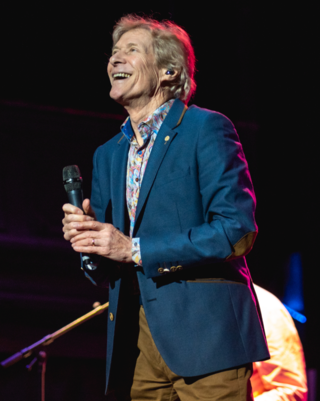
Paul Jones is an English singer, actor, harmonicist, radio personality and television presenter. He first came to prominence as the original lead singer and harmonicist of the rock band Manfred Mann (1962–66) with whom he had several hit records including "Do Wah Diddy Diddy" and "Pretty Flamingo".

Manfred Mann's Earth Band are an English rock band formed by South African musician Manfred Mann. Their hits include covers of Bruce Springsteen's "For You", "Blinded by the Light" and "Spirit in the Night". After forming in 1971 and with a short hiatus in the late 1980s/early 1990s, the Earth Band continues to perform and tour, as of 2024.

"Light My Fire" is a song by the American rock band the Doors. Although it was principally written by the band's guitarist, Robby Krieger, songwriting was credited to the entire band. Recognized as one of the earliest examples of psychedelic rock, it was recorded in August 1966 and released in January 1967 on their eponymous debut album. Due to its erotic lyrics and innovative structure, the track has come to be regarded as synonymous with the 1960s psychedelic and sexual revolutions.
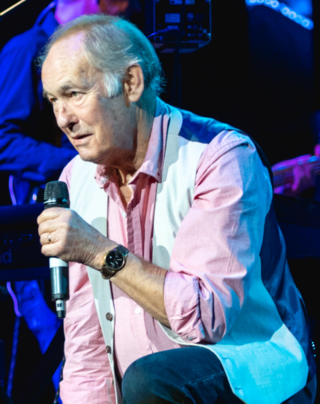
Michael David d'Abo is an English singer and songwriter, best known as the lead vocalist of Manfred Mann from 1966 to their dissolution in 1969, and as the composer of the songs "Handbags and Gladrags" and "Build Me Up Buttercup", the latter of which was a hit for The Foundations. With Manfred Mann, d'Abo achieved six top twenty hits on the UK Singles Chart including "Semi-Detached, Suburban Mr. James", "Ha! Ha! Said the Clown" and the chart topper "Mighty Quinn". He is the father to actress Olivia d'Abo.
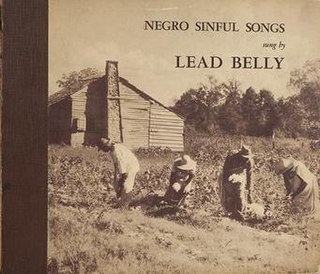
"Black Betty" is a 20th-century African-American work song often credited to Huddie "Lead Belly" Ledbetter as the author, though the earliest recordings are not by him. Some sources say it is one of Lead Belly's many adaptations of earlier folk material.

"Blinded by the Light" is a song written and recorded by Bruce Springsteen, which first appeared on his 1973 debut album Greetings from Asbury Park, N.J. A cover by British rock band Manfred Mann's Earth Band reached number one on the Billboard Hot 100 in the United States in February 1977 and was also a top ten hit in the United Kingdom, New Zealand, and Canada.

"You Don't Know Me" is a song written by Eddy Arnold and Cindy Walker in 1955. "You Don't Know Me" was first recorded by Arnold that year and released as a single on April 21, 1956, on RCA Victor. The best-selling version of the song is by Ray Charles, who took it to number 2 on the Billboard Hot 100 chart in 1962, after releasing the song on his number 1 album Modern Sounds in Country and Western Music. The first version of the song to make the Billboard charts was by Jerry Vale in 1956, peaking at number 14 on the pop chart. Arnold's version charted two months later, released as an RCA Victor single, 47–6502, backed with "The Rockin' Mockin' Bird", which reached number 10 on the Billboard country chart. Cash Box magazine, which combined all best-selling versions at one position, included a version by Carmen McRae that never appeared in the Billboard Top 100 Sides listing.

"I Say a Little Prayer" is a song written by Burt Bacharach and Hal David for Dionne Warwick, originally peaking at number four on the U.S. Billboard Hot 100 pop singles chart in December 1967. On the R&B Singles chart it peaked at number eight. The following year, it was a top ten hit for Aretha Franklin.

"Quinn the Eskimo (The Mighty Quinn)" is a folk-rock song written and first recorded by Bob Dylan in 1967 during the Basement Tapes sessions. The song's first release was in January 1968 as "Mighty Quinn" in a version by the British band Manfred Mann, which became a great success. It has been recorded by a number of performers, often under the "Mighty Quinn" title.

"Just Like a Woman" is a song by the American singer-songwriter Bob Dylan from his seventh studio album, Blonde on Blonde (1966). The song was written by Dylan and produced by Bob Johnston. Dylan allegedly wrote it on Thanksgiving Day in 1965, though some biographers doubt this, concluding that he most likely improvised the lyrics in the studio. Dylan recorded the song at Columbia Studio A in Nashville, Tennessee in March 1966. The song has been criticized for sexism or misogyny in its lyrics, and has received a mixed critical reaction. Some critics have suggested that the song was inspired by Edie Sedgwick, while other consider that it refers to Dylan's relationship with fellow folk singer Joan Baez. Retrospectively, the song has received renewed praise, and in 2011, Rolling Stone magazine ranked Dylan's version at number 232 in their list of the 500 Greatest Songs of All Time. A shorter edit was released as a single in the United States during August 1966 and peaked at number 33 on the Billboard Hot 100. The single also reached 8th place in the Australian charts, 12th place on the Belgium Ultratop Wallonia listing, 30th in the Dutch Top 40, and 38th on the RPM listing in Canada.

"Do Wah Diddy Diddy" is a song written by Jeff Barry and Ellie Greenwich and originally recorded in 1963, as "Do-Wah-Diddy", by the American vocal group the Exciters. Cash Box described the Exciters' version as "a sparkling rocker that bubbles over with coin-catching enthusiasm" and said that the "great lead job is backed by a fabulous instrumental arrangement." It was made internationally famous by the British band Manfred Mann.
"Lily the Pink" is a 1968 song released by the UK comedy group The Scaffold, which reached No. 1 in the UK Singles Chart. It is a modernisation of an older folk song titled "The Ballad of Lydia Pinkham". The lyrics celebrate the "medicinal compound" invented by Lily the Pink, and humorously chronicle the "efficacious" cures it has brought about, such as inducing morbid obesity to cure a weak appetite, or bringing about a sex change as a remedy for freckles.
"Right Now" is an uptempo 1962 jazz/pop song with music by Herbie Mann and lyrics by Carl Sigman. As a jazz instrumental, it was the title track of Right Now, a 1962 bossa nova-style album by Mann. Later that same year, with lyrics by Sigman, the song was popularized by jazz singer Mel Tormé on his album Comin' Home Baby!, and was the B-side of the single featuring the title track.
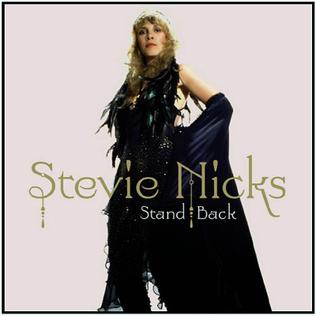
"Stand Back" is a song by American singer-songwriter Stevie Nicks from her second solo studio album The Wild Heart (1983). The song was released as the lead single from the album in May 1983 and reached number five on the Billboard Hot 100 and number two on the Top Mainstream Rock Tracks chart in August of that year. "Stand Back" has been a staple in Nicks' live shows since its pre-album debut at the 1983 US Festival, and it has also been included in the Fleetwood Mac tour set lists since 1987.
This is the discography of English rock band Manfred Mann.
"Fox on the Run" is a song written by Tony Hazzard, first recorded by the English band Manfred Mann, and released as a single on 29 November 1968. It reached No. 5 on the UK Singles Chart in late January 1969.
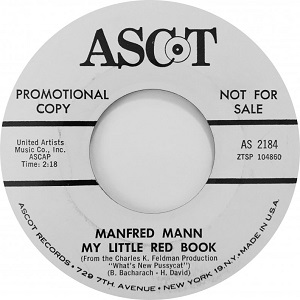
"My Little Red Book" (occasionally subtitled "(All I Do Is Talk About You)") is a song composed by American songwriter Burt Bacharach with lyrics by Hal David. The duo was enlisted by Charles K. Feldman to compose the music to Woody Allen's film What's New Pussycat? following a chance meeting between Feldman and Bacharach's fiancée Angie Dickinson in London. "My Little Red Book" was composed in three weeks together with several other songs intended for the movie. Musically, the song was initially composed in the key of C major, largely based on a reiterating piano riff performed. David's lyrics tells the tale of a distraught lover, who after getting dumped by his girlfriend browses through his "little red book" and taking out several girls to dance in a vain effort to get over her.

"Ha! Ha! Said the Clown" is a song written by Tony Hazzard, first recorded by British pop group Manfred Mann. Hazzard claims the song "came out of the blue" though he did not demo it for weeks. Following recording a demo, he approached manager Gerry Bron, who liked it enough to want one of his groups, Manfred Mann, to record it. Manfred Mann recorded their version of the single on 10 February 1967 at Philips Studio in Marble Arch, London, together with producer Shel Talmy. It was the second of three singles Manfred Mann recorded to feature the Mellotron.
References
- 1 2 3 "BI's Chart Fax" (PDF). Beat Instrumental (8): 17. August 1968. Retrieved 10 February 2023.
- 1 2 "AFI Catalog of Feature Films – You Are What You Eat". American Film Institute . Retrieved 17 July 2014.
- ↑ Shinner, Merrill (13 April 1977). "Manfred Mann rewrites the past". St. Petersburg Times . Retrieved 17 July 2014.
- 1 2 Betts, Graham (2004). Complete UK Hit Singles 1952–2004 (1st ed.). London: Collins. p. 488. ISBN 0-00-717931-6.
- 1 2 Joel Whitburn's Bubbling Under the Billboard Hot 100 1959-2004
- ↑ "Bray.html". Sep 22, 2004. Archived from the original on 22 September 2004. Retrieved January 23, 2025.
- ↑ GarboForever.com. Retrieved 17 July 2014
- ↑ Mark Christensen, Acid Christ: Ken Kesey, LSD, and the Politics of Ecstasy, IPG, 2010, p.203, Retrieved 17 July 2014
- ↑ Greta Garbo Home for Wayward Boys and Girls, discussion at HipForums.com. Retrieved 17 July 2014
- ↑ The Kashu Hotel by Jerry F. Schimmel
- ↑ Lange, Dorothea (Jan 23, 1942). "San Francisco(?), Calif. Apr. 1942. A sign in a window of the Hotel Kashu owned by a Japanese-American among those ordered to evacuate and, later, to go to War Relocation Authority centers for the duration of the war. It offers to give away kittens". Loc.gov. Retrieved January 23, 2025.
- ↑ Christ United Presbyterian Church nichibei.org
- ↑ Tobler, John (1992). NME Rock 'N' Roll Years (first ed.). London: Reed International Books Ltd. p. 185. CN 5585.
- ↑ My Name Is Jack (Mono Version) on YouTube
- ↑ "Go-Set National Top 40, 28 August 1968". Poparchives.com.au. Retrieved January 23, 2025.
- ↑ "Item Display – RPM – Library and Archives Canada". Collectionscanada.gc.ca. 1968-08-03. Retrieved 2018-07-04.
- ↑ Nyman, Jake (2005). Suomi soi 4: Suuri suomalainen listakirja (in Finnish) (1st ed.). Helsinki: Tammi. p. 201. ISBN 951-31-2503-3.
- ↑ "The Irish Charts – Search Results – My Name Is Jack". Irish Singles Chart. Retrieved June 6, 2018.
- ↑ "Flavour of new zealand - search listener". Flavourofnz.co.nz. Retrieved January 23, 2025.